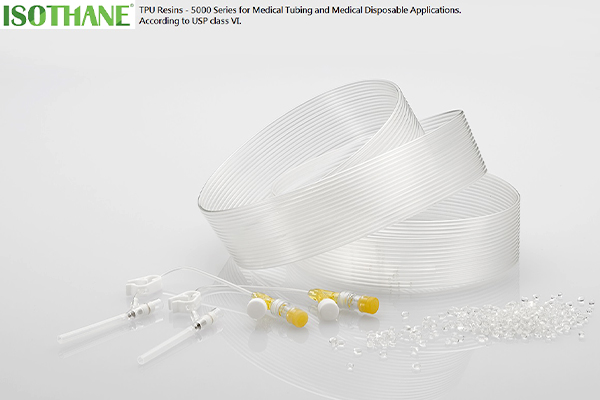Total : 0
TPU Resin, Thermoplastic Polyurethane
Bio-compatible Grade
ISOTHANE 5000 Series Bio-compatible Grade

| Item Name | ISOTHANE 5000 Series Bio-compatible Grade |
|---|---|
| Characteristics | ISOTHANE®5000 series products are polyether based thermoplastic polyurethanes. They exhibit excellent bio-compatibility according to USP class VI hydrolytic resistance, fungus resistance, and low temperature performance properties. ISOTHANE®5000 series can be injection molded , blow molded, and extruded. |
| Suggested Applications | Medical Tubing and Medical Disposable Applications. |
| Item Name | Polyether based TPU Resins Bio-compatible Grade |
|---|---|
| Description | ISOTHANE 5000 series products are polyether based thermoplastic polyurethanes. They exhibit excellent bio-compatibility, hydrolytic resistance, fungus resistance, and low temperature performance properties. These products can be injection molded, blow molded, and extruded. |
| Supply and Storage | ISOTHANE TPU resins are supplied in pellet form packed in 25kg moisture proof bags. All TPU resins have been dried before packing. ISOTHANE TPU resins should be stored in cool and dry environment in their original containers until be used. Storage temperature should not exceed 30°C. If only a portion of TPU resins was used from a bag, the remainder of TPU resins should be tightly closed. |
| Drying | TPU resins are hygroscopic and pre-drying of TPU resins is always a necessary step before processing. Depend on the climate, the granule exposed to the atmosphere will absorb moisture very quickly. The moisture might bring about partial degradation of polymers and the formation of bubbles or streaks in the molded and extruded parts. In order to ensure the efficient and successful processing into quality parts, the moisture content in TPU resins is recommended less than 0.02%. A desiccant-bed-type hopper dryer is recommended for drying ISOTHANE 5000 series. The dew point of the inlet air should be in the range of -30 to -40°C. About the recommended drying conditions, please view ISOTHANE individual data sheets. |
| Processing - Extrusion | Barrel and Motor
|
| Processing - Injection Molding | Barrel and Motor
|
| Coloring | Generally, ISOTHANE TPU resins are supplied in their natural color. They can be colored by blending with pigment or pigment master batch. Using master batch based on TPU is recommended. Other master batch based on polyethylene or polystyrene is suitable to a limited extent. All colorants employed in TPU resins must be pre-dried before processing. The normal addition of pigment or pigment master batch is 0.2%-0.5% or 1-3%. |
| Additives | Various additives can be used to enhanced the properties of ISOTHANE TPU resins, e.g. anti-blocking agents, antioxidant, UV stabilizers or release agents. Most additives supplied as master batches are available. But not all additives are compatible with ISOTHANE TPU resins. It is recommended to inquire of your suppliers or our technical service before compounding. |
| Recycling | For ISOTHANE TPU resins, up to 20% of regrind may be recycled with virgin material depending on finished parts requirements. The regrind material has to be kept free of contamination, diced and dried before re-using. The material which has been contaminated, discolored or degraded is not suitable for recycling. TPU resins may decrease desired properties, e.g. hardness and mechanical properties, due to improperly mixing with regrind. Regulatory or testing organizations (e.g., UL) may have specific requirements limiting the allowance amount of regrind. Certain quality requirements laid down in specifications may exclude the use of regrind material. |
| Healthy and Safety Information | Before working with these products, it is essential that all operators are aware of the healthy and safety precautions. ISOTHANE TPU resins can be processed or machined over a wide range of temperature. There can be some smoke formation during processing. The smoke that contains some decomposition substances of TPU or additives may cause irritation to human body. Generally, the temperature does not exceed 240°C that can reduce decomposition formation. An effective extraction system, especially in the melt outlet zone, is necessary. The detail information concerning healthy and safety can be available in safety data sheets (SDS) or contact our technical service. |
| Disposal | ISOTHANE TPU resins present no hazard to the environment or water. They can be dumped on municipal landfill or in a waste incineration plant. The official regulations on waste disposal should be observed. |
| Item | Units | ASTM | 5075A | 5080A | 5085A | 5090A | 5095A |
|---|---|---|---|---|---|---|---|
| Specific Gravity | D-792 | 1.10 | 1.12 | 1.13 | 1.13 | 1.15 | |
| Hardness | Shore A | D-2240 | 75A | 82A | 85A | 90A | 95A |
| Tensile Strength | MPa psi |
D-412 | 31 4500 |
37 5300 |
39 5600 |
41 6000 |
51 7300 |
| @ 50% elongation | MPa psi |
D-412 | 2.3 340 |
3.6 520 |
3.9 560 |
6.2 900 |
15 2180 |
| @ 100% elongation | MPa psi |
3.2 460 |
5.4 780 |
5.9 850 |
8.3 1200 |
19 2820 |
|
| @ 300% elongation | MPa psi |
5.9 850 |
10 1500 |
12 1800 |
17 2400 |
36 5240 |
|
| Elongation @ Break | % | D-412 | 650 | 620 | 540 | 550 | 438 |
| Tear Strength | N/mm lb/in |
D-624 DIE C |
70 400 |
80 450 |
90 500 |
120 700 |
190 1060 |
| Flexural Modulus | MPa psi |
D-792 | 29 4140 |
35 5050 |
43 6200 |
72 10400 |
96 14000 |
| Item | Units | ASTM | 5055D | 5065D | 5075D | 8101-B | 8102-B |
|---|---|---|---|---|---|---|---|
| Specific Gravity | D-792 | 1.17 | 1.17 | 1.18 | 1.20 | 1.18 | |
| Hardness | Shore D | D-2240 | 57D | 65D | 74D | 80D | 76D |
| Tensile Strength | MPa psi |
D-412 | 51 7340 |
53 7670 |
54 7760 |
75 11000 |
60 8700 |
| @ 50% elongation | MPa psi |
D-412 | 25 3610 |
35 5030 |
46 6640 |
1480 214000 |
1080 156000 |
| @ 100% elongation | MPa psi |
31 4490 |
40 5790 |
46 6740 |
|||
| @ 300% elongation | MPa psi |
48 6980 |
49 7110 |
52 7540 |
|||
| Elongation @ Break | % | D-412 | 400 | 340 | 322 | 125 | 150 |
| Tear Strength | N/mm lb/in |
D-624 DIE C |
225 1280 |
270 1540 |
370 2100 |
- | - |
| Flexural Modulus | MPa psi |
D-792 | 134 19500 |
420 60800 |
1360 197000 |
1730 250000 |
1370 198000 |
While the above information is presented in good faith and believed to be accurate, GRECO does not guarantee satisfactory results from reliance upon such information and disclaims all liability for any loss or damage arising out of its use.

